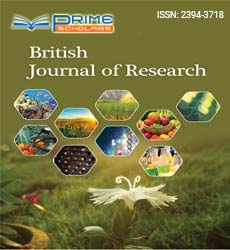Perspective - (2024) Volume 11, Issue 3
Harnessing Nature's Remedies: The Rise of Natural Treatments in Healthcare Discovery
Mahdis Ozra*
Department of Clinical Research, Sullivan University, USA
*Correspondence:
Mahdis Ozra,
Department of Clinical Research, Sullivan University,
USA,
Email:
Received: 28-Feb-2024, Manuscript No. IPBJR-24-19451;
Editor assigned: 01-Mar-2024, Pre QC No. IPBJR-24-19451 (PQ);
Reviewed: 15-Mar-2024, QC No. IPBJR-24-19451;
Revised: 20-Mar-2024, Manuscript No. IPBJR-24-19451 (R);
Published:
27-Mar-2024, DOI: 10.35841/2394-3718-11.3.25
Introduction
In the pursuit of improved health and wellness, there has been
a notable resurgence in exploring natural treatments as viable
alternatives or complements to conventional medicine. With a
growing body of research supporting the efficacy and safety of
natural remedies, healthcare professionals and patients alike
are increasingly turning to nature’s bounty for solutions to a
wide range of health conditions. In this article, we delve into
recent discoveries in healthcare that highlight the promising
role of natural treatments in promoting well-being and
addressing health challenges.
Description
One of the key drivers behind the resurgence of natural
treatments in healthcare is the rediscovery and validation
of traditional medicine practices from around the world.
Indigenous healing systems such as Traditional Chinese
Medicine (TCM), Ayurveda, and Native American medicine
have long relied on botanicals, herbs, and other natural
substances to promote health and treat illness. Modern
research is shedding new light on the therapeutic properties
of these traditional remedies, identifying bioactive compounds
and elucidating their mechanisms of action. For example,
herbs such as turmeric, ginger, and garlic, which have been
used for centuries in various traditional medicine systems,
have garnered attention for their potent anti-inflammatory,
antioxidant, and immune-modulating effects. Curcumin, the
active compound in turmeric, has been extensively studied
for its anti-inflammatory properties and its potential role in
preventing and managing chronic diseases such as cancer,
arthritis, and neurodegenerative disorders. Furthermore,
traditional herbal remedies like ginseng, ginkgo biloba, and
ashwagandha have demonstrated adaptogenic properties,
helping the body adapt to stress and restore balance. These
herbs have been found to support adrenal function, enhance
resilience to stressors, and improve energy levels and cognitive
function. In recent years, there has been a resurgence of
interest in pharmacognosy, the study of medicinal plants and
their pharmacological properties. Researchers are increasingly
turning to nature’s pharmacopeia to identify new bioactive
compounds with therapeutic potential. Advances in botanical
medicine have led to the discovery of novel phytochemicals,
herbal extracts, and plant-derived compounds that exhibit
a wide range of health benefits. For instance, resveratrol,
a polyphenol found in red wine and grapes, has attracted
attention for its antioxidant and anti-inflammatory properties,
as well as its potential cardioprotective effects. Studies suggest
that resveratrol may help lower blood pressure, reduce
cholesterol levels, and protect against cardiovascular disease.
Similarly, botanical extracts such as echinacea, elderberry, and
astragalus have gained popularity for their immune-enhancing
properties. These botanicals contain bioactive compounds that
stimulate the immune system, enhance immune function, and
support the body’s natural defenses against infections and
illness. Integrative medicine practitioners work collaboratively
with patients to develop personalized treatment plans that
address the root causes of illness and promote overall health
and wellness. This may involve a combination of dietary
and lifestyle modifications, nutritional supplements, herbal
remedies, mind-body practices, and conventional medical
interventions as needed.
Conclusion
In conclusion, the resurgence of natural treatments in
healthcare reflects a broader shift towards a more holistic
and personalized approach to health and wellness. Recent
discoveries in pharmacognosy, botanical medicine, and
integrative medicine highlight the promising role of natural
remedies in promoting health and addressing a wide range of
health conditions. As research in this field continues to evolve,
there is growing recognition of the importance of harnessing
nature’s remedies in our quest for optimal health and wellbeing.
Citation: Ozra M (2024) Harnessing Nature’s Remedies: The Rise of Natural Treatments in Healthcare Discovery. Br J Res. 11:25.
Copyright: © 2024 Ozra M. This is an open-access article distributed under the terms of the Creative Commons Attribution License, which permits unrestricted use, distribution, and reproduction in any medium, provided the original author and source are credited.

